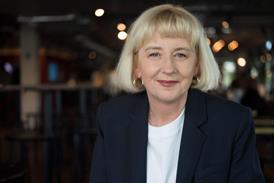How did Ed Vaizey measure up in his first public address of the industry since abolishing the UK Film Council?
UK Culture Minister Ed Vaizey faced the film industry for the first time yesterday in almost three months since he announced the abolition of the UK Film Council (UKFC). He arrived to close the Screen UK Film Summit in London on Wednesday, taking questions about the consultation process with the industry in which he has been engaged since the shocking announcement on July 26.
Vaizey was visibly nervous when he faced the crowd composed of nearly 200 industry delegates. And while he confessed that the handling of the announcement was unlikely to win him any “PR Week awards”, he also joked that the emotional response to the closure of the UKFC was out of whack with the facts; this was hardly the closure of the National Health Service, after all, he said.
As Vaizey spoke and then fielded questions, he perked up. He was not to be attacked as he might have expected, and while there were some tough questions, the politician performed with consummate skill – convincing in his knowledge of the industry and its history, addressing people he knew by name and articulate in his defence of his government’s position and hints as to which direction the new film policy would go.
Vaizey, of course, had been on the same stage a year previously as the shadow culture minister, making pledges of support for the status quo which would prove unreliable when his party took power in a coaltion government a few months later.
His charisma, however, was undeniable, and in an industry where big personalities are often as persuasive as high IQs, MBAs or business acumens, he fit right in.
How the new structure will fall out is yet to be seen although it seems likely that Adrian Wootton’s Film London will absorb the critically important tax credit certification and film commission functions. The lottery development and production funding responsibilities could end up at Film London as well, although bids from the British Film Institute and The Arts Council are also in play. It seems likely that the team which decides the allocation of the funding led by Tanya Seghatchian will go with the fund to whichever home it may go.
The summit, however, didn’t focus exclusively on the post-UKFC public funding landscape and there are clearly other ports of call for finance other than the three traditional funding stops of UKFC, BBC Films and Film4 – which was flush with its newly expanded £15m annual budget.
Olivier Courson outlined the strategy behind StudioCanal, the most viable European studio model since PolyGram, which includes a busy UK production programme via local distribution unit Optimum Releasing. Entrepreneurs Barnaby Thompson of Ealing Studios and Matthew Justice who runs Big Talk with Nira Park talked about the evolution of their companies into sustainable businesses. And all four chief executives on the distribution panel – Zygi Kamasa of Lionsgate UK, Justin Marciano of Revolver, Danny Perkins of Optimum and Alex Hamilton of eOne – explained their strategies for making or pre-buying British films.
Also yesterday morning the Production Finance Market (PFM) announced that Jeremy Thomas would be delivering the keynote speech at its London event next week. Thomas, one of the film world’s great independent producer/entrepreneurs, continues to operate from and participate actively in the UK.
So while the production community at large continues to focus intently on the – relatively paltry - amount of £15m in Lottery funds theoretically available to all and sundry, perhaps the most illuminating realization to me from the Summit was that the UK contains a vibrant plurality of gatekeepers beyond the three old stalwarts.
And not surprisingly, this being the film business, these alternative gatekeepers are colourful, articulate men and women whose good taste, commercial nous and politician-standard ability to talk to artists and bankers in the same breath has equipped them with the savvy to construct solid businesses.
As a skilled operator himself, Ed Vaizey was not a million miles away from many of the delegates in the room.































No comments yet